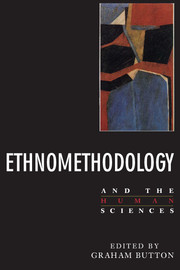Book contents
- Frontmatter
- Contents
- Contributors
- Preface
- 1 Introduction: ethnomethodology and the foundational respecification of the human sciences
- 2 Respecification: evidence for locally produced, naturally accountable phenomena of order, logic, reason, meaning, method, etc. in and as of the essential haecceity of immortal ordinary society (I) – an announcement of studies
- 3 Logic: ethnomethodology and the logic of language
- 4 Epistemology: professional scepticism
- 5 Method: measurement – ordinary and scientific measurement as ethnomethodological phenomena
- 6 Method: evidence and inference – evidence and inference for ethnomethodology
- 7 The social actor: social action in real time
- 8 Cognition: cognition in an ethnomethodological mode
- 9 Language and culture: the linguistic analysis of culture
- 10 Values and moral judgement: communicative praxis as moral order
- References
- Index
1 - Introduction: ethnomethodology and the foundational respecification of the human sciences
Published online by Cambridge University Press: 05 June 2012
- Frontmatter
- Contents
- Contributors
- Preface
- 1 Introduction: ethnomethodology and the foundational respecification of the human sciences
- 2 Respecification: evidence for locally produced, naturally accountable phenomena of order, logic, reason, meaning, method, etc. in and as of the essential haecceity of immortal ordinary society (I) – an announcement of studies
- 3 Logic: ethnomethodology and the logic of language
- 4 Epistemology: professional scepticism
- 5 Method: measurement – ordinary and scientific measurement as ethnomethodological phenomena
- 6 Method: evidence and inference – evidence and inference for ethnomethodology
- 7 The social actor: social action in real time
- 8 Cognition: cognition in an ethnomethodological mode
- 9 Language and culture: the linguistic analysis of culture
- 10 Values and moral judgement: communicative praxis as moral order
- References
- Index
Summary
The vogue for fashionable ideas in sociology is fickle. Sociologists eagerly latch onto what appear to be new bodies of thought; they toy with them for awhile (organising symposium to discuss their significance for the discipline, giving over special editions of the discipline's journals to them, and proliferating texts that debate their merits), but then, often as not, sociology moves on. Giddens and Turner's (1987) Social Theory Today, is, in some respects, a partial history of fashionable thought in sociology. Many of the ‘theories’ they include once held the attention of the whole discipline, but now, by and large, whilst they still have their adherents, sociology is not as keenly focussed upon the distinctive issues they raise as it once was. The bloom of the ‘new moment’ fades, and it becomes part of the humus of ‘social theory today’ which generally nourishes the discipline.
The way in which sociology generates, and then accommodates, the advent of a ‘new moment’, tells us something about the business of sociology. Both the merchandisers and consumers of ‘new moves’ work that business in their testimony to what they constitute, even in their seeming mercurial character, as ‘the stable properties of the discipline's foundations’. This means that despite the radical claims that often accompany the development of a ‘new body of thought’ there is just as often a comforting conceptual, epistemological, and methodological familiarity to the arguments.
- Type
- Chapter
- Information
- Ethnomethodology and the Human Sciences , pp. 1 - 9Publisher: Cambridge University PressPrint publication year: 1991
- 14
- Cited by

